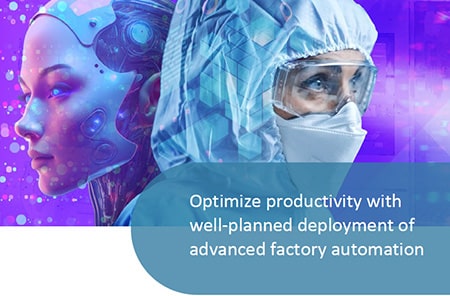Smart manufacturing is a term widely used in many industries. As commonplace as the term has become, it’s not always easy to identify exactly what makes it smart and what it means specifically for semiconductor manufacturers. Essentially, smart manufacturing is an approach that integrates multiple factory systems (such as those that track lots, processes, scheduling, and distribution) to improve the accuracy and quality of data and communication. The following are seven key benefits you can get from smart manufacturing solutions in semiconductor manufacturing.
Improved productivity through collaboration
Actionable insights
Digital information derived from real-time insights leads to better use of resources and optimized factory performance. Knowing what’s happening on the line in real-time—including instant notification of problems and their causes – allows for better problem solving, less downtime and greater productivity.
Improved efficiency
Having accurate insights into equipment and process state lets you predict downtime and failures. Predictive and prescriptive maintenance enables you to plan optimum maintenance intervals. And, with automated data capture and analysis, systems can identify when a problem arises, notify the appropriate stakeholders and recommend (or even implement) the appropriate intervention.
Quick, good decisions
Integration of systems, real-time data and user-friendly interfaces create opportunities for faster, more informed problem solving that can improve overall quality.
Continual improvement
The wealth of data provided by smart manufacturing lets you spot trends, identify areas for improvement, and put plans in place. Once implemented, real-time data will provide insight into how your actions impacted your KPIs so you can then focus on improvements in other areas.
Accurate, on-time delivery
With better insight and control over lot cycle time and output, as well as better utilization of resources, smart manufacturing helps predict an accurate delivery schedule and stick to it.
Secure options
Options to store data on-premises, on a secure cloud or in a hybrid of the two lets you decide what is best for your performance and data requirements.
Most importantly, smart manufacturing can vary depending on the size of the factory and the priorities of the business. Consider the KPIs that mean the most to you and adopt a solution that aligns with your needs and the needs of your customers.

